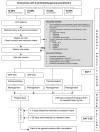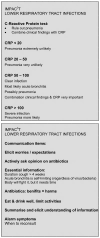Improving management of patients with acute cough by C-reactive protein point of care testing and communication training (IMPAC3T): study protocol of a cluster randomised controlled trial
- PMID: 17394651
- PMCID: PMC1847819
- DOI: 10.1186/1471-2296-8-15
Improving management of patients with acute cough by C-reactive protein point of care testing and communication training (IMPAC3T): study protocol of a cluster randomised controlled trial
Abstract
Background: Most antibiotic prescriptions for acute cough due to lower respiratory tract infections (LRTI) in primary care are not warranted. Diagnostic uncertainty and patient expectations and worries are major drivers of unnecessary antibiotic prescribing. A C-reactive protein (CRP) point of care test may help GPs to better guide antibiotic treatment by ruling out pneumonia in cases of low test results. Alternatively, enhanced communication skills training to help clinicians address patients' expectations and worries could lead to a decrease in antibiotic prescribing, without compromising clinical recovery, while enhancing patient enablement. The aim of this paper is to describe the design and methods of a study to assess two interventions for improving LRTI management in general practice.
Methods/design: This cluster randomised controlled, factorial trial will introduce two interventions in general practice; point of care CRP testing and enhanced communication skills training for LRTI. Twenty general practices with two participating GPs per practice will recruit 400 patients with LRTI during two winter periods. Patients will be followed up for at least 28 days. The primary outcome measure is the antibiotic prescribing rate. Secondary outcomes are clinical recovery, cost-effectiveness, use of other diagnostic tests and medical services (including reconsultation), and patient enablement.
Discussion: This trial is the first cluster randomised trial to evaluate the influence of point of care CRP testing in the hands of the general practitioner and enhanced communication skills, on the management of LRTI in primary care. The pragmatic nature of the study, which leaves treatment decisions up to the responsible clinicians, will enhance the applicability and generalisability of findings. The factorial design will allow conclusion to be made about the value of CRP testing on its own, communication skills training on its own, and the two combined. Evaluating a biomedical and communication based intervention ('hard' and 'soft' technologies) together in this way makes this trial unique in its field.
Figures
References
-
- Van der Velden J. Basisrapport morbiditeit in de huisartspraktijk. NIVEL; 1991.
-
- Verheij TJM, Salomé PL, Bindels PJ, Chavannes AW, Ponsioen BP, Sachs APE, Thiadens HA, Romeijnders ACM, Van Balen JAM. NHG-Standaard Acuut hoesten. [Dutch College of General Practitioners Guidelines on Acute Cough] Huisarts Wet. 2003;46:496–506.
-
- Steinman MA, Gonzales R, Linder JA, Landefeld CS. Changing Use of Antibiotics in Community-Based Outpatient Practice, 1991-1999. Ann Intern Med. 2003;138:525–533. - PubMed
-
- Smucny J, Fahey T, Becker L, Glazier R. Antibiotics for acute bronchitis. Cochrane Database Syst Rev. 2004. - PubMed
Publication types
MeSH terms
Substances
LinkOut - more resources
Full Text Sources
Other Literature Sources
Medical
Research Materials
Miscellaneous



